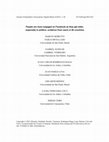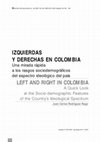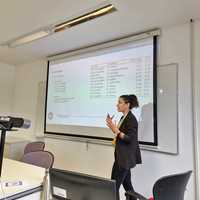Papers by Juan Carlos Rodríguez-Raga
Colombia Internacional, Dec 31, 2023

Bristol University Press eBooks, Sep 30, 2020
This chapter uses a specific case example from the Colombian Constitutional Court (CCC) that prov... more This chapter uses a specific case example from the Colombian Constitutional Court (CCC) that provides insights into the phenomena of judicialization of politics and public policy. It explains the structure, powers and operation of the CCC and examines its decisions with respect to public policy on illicit drugs as part of the peace agreement. It also describes the way CCC has recently dealt with one dimension of the illicit drugs public policy related to the peace agreement reached between the Colombian government and the now demobilized guerrilla group FARC-EP. The chapter mentions the abstract constitutional review, which is an instrument the CCC uses to protect the integrity of the system of legal rules and comply with the constitutional provisions. It summarizes the highlights of the policy analysis toolbox used by the CCC and suggests a future research agenda.
Bulletin of Latin American Research

Journal of Quantitative Description: Digital Media
A growing body of literature has noted an age pattern in the sharing of false news in social medi... more A growing body of literature has noted an age pattern in the sharing of false news in social media, with older people sharing more often misinformation than younger users. In this article we supplement this literature by documenting two distinct but complementary phenomena: Facebook users share more content as they get older regardless of whether it is political; and that this increment in sharing activity as age increases is more intense with political and partisan URLs. Based on the Facebook Privacy-Protected Full URLs Data Set, a vast Facebook database with demographic information of those who saw and shared links on Facebook in 46 countries, we investigate the impact of age on link-sharing activity. We found that in 43 countries, the average age of people who shared links was considerably higher than the age of those who saw the links. In a more detailed study, with Facebook users in South America, we find that the average age increases consecutively in the sharing of non-politi...
The Limits of Judicialization
Simulated data on veto players (Stata)
Stata do-file to replicate the analysis presented in Tables 3 and 4
This paper develops a computational model to explore the effect of veto players in presidential r... more This paper develops a computational model to explore the effect of veto players in presidential regimes. We discuss the relationship between the legislative powers of the president and the configuration of veto players, and analyze how the number of legislative parties and their cohesion affect policy stability we develop a computational model to estimate the simultaneous impact of these factors in a conventional two-dimensional policy space. The results suggest that party fragmentation has mixed implications while decree authority is a key factor explaining policy stability. The impact of most institutional variables is conditional on the position of the players.
Dejusticia- Centro de estudios de derecho, justicia y sociedad, 2011
Capítulo 1 Introducción: Instituciones, conflicto armado y poder político en el municipio colombi... more Capítulo 1 Introducción: Instituciones, conflicto armado y poder político en el municipio colombiano (2001-2011

During two terms in office, Álvaro Uribe enjoyed very high approval ratings. This deviates from t... more During two terms in office, Álvaro Uribe enjoyed very high approval ratings. This deviates from the typical approval patterns exhibited by most executives in the region and from prior Colombian presidents. In this paper we give elements to understand what explains Uribe’s eight-year honeymoon. Here we argue that Uribe’s popularity was the interplay of three factors: A ruling style that allowed him to build an affective link with citizens. Uribe’s ability to create a rally-around-the-flag atmosphere regarding the internal armed conflict. And a booming economy. Using regression models based on cross-national and survey data results indicate that: Uribe exhibited high approval ratings because he was part of a group of Latin American executives who developed a government style based on an emotional link with people, and that those citizens who saw the internal conflict as the main problem in Colombia and were more exposed to Uribe’s messages about the insurgent threat were more likely t...
por su valiosa asistencia en esta investigación. Juan Carlos Rodríguez-Raga agradece, además, a l... more por su valiosa asistencia en esta investigación. Juan Carlos Rodríguez-Raga agradece, además, a la Facultad de Ciencias Sociales de esta Universidad por la obtención de un stAI (semestre de trabajo académico independiente) durante la primera mitad de 2020, que permitió completar este artículo. Por otra parte, queremos agradecer los comentarios de quienes participaron en el Coloquio del
SSRN Electronic Journal, 2021
Evidence is emerging that old adults share more disinformation online and are more politically po... more Evidence is emerging that old adults share more disinformation online and are more politically polarized. Based on the Facebook Privacy-Protected Full URLs Data Set, a vast Facebook database with demographic information of those who saw and shared links on Facebook in 46 countries, we investigated the impact of age on link-sharing activity. We found that in 45 of 46 countries, the average age of people who shared links was considerably higher than the age of those who saw the links. In a more detailed study, with 82% of Facebook users residing in South America, we found that the average age increases consecutively in the sharing of non-political content, in the sharing of political content and in the sharing of partisan sites.
Policy Analysis in Colombia, 2020

Colombia Internacional, 2007
Una mirada rápida a los rasgos sociodemográficos del espectro ideológico del país LEFT AND RIGHT ... more Una mirada rápida a los rasgos sociodemográficos del espectro ideológico del país LEFT AND RIGHT IN COLOMBIA A Quick Look at the Socio-demographic Features of the Country's Ideological Spectrum 185 Izquierdas y derechas en Colombia • Juan Carlos Rodríguez Raga Resumen A partir de un panorama comparativo entre las posiciones ideológicas de los ciudadanos de Colombia, Venezuela y Uruguay, el autor describe algunos de los rasgos característicos del actual espectro ideológico del país. En éste se observa cómo los colombianos están más a la derecha del espectro ideológico que la mayoría de las sociedades latinoamericanas, que han girado a la izquierda. La encuesta del Proyecto de Opinión Pública de América Latina (LAPOP, por su sigla en inglés), realizada en 2006 a 19 países de la región, muestra que, en promedio, sólo los ciudadanos de República Dominicana y Honduras tienen posiciones más derechistas que los colombianos.
Latin American Research Review, 2016

Revista Latinoamericana de Opinión Pública, 2019
During two terms in office, Álvaro Uribe enjoyed very high approval ratings. This deviates from t... more During two terms in office, Álvaro Uribe enjoyed very high approval ratings. This deviates from the typical approval patterns exhibited by most executives in the region and from prior Colombian presidents. In this paper we give elements to understand what explains Uribe's eight-year honeymoon. Here we argue that Uribe's popularity was the interplay of three factors: A ruling style that allowed him to build an affective link with citizens. Uribe's ability to create a rally-around-the-flag atmosphere regarding the internal armed conflict. And a booming economy. Using regression models based on cross-national and survey data results indicate that: Uribe exhibited high approval ratings because he was part of a group of Latin American executives who developed a government style based on an emotional link with people, and that those citizens who saw the internal conflict as the main problem in Colombia and were more exposed to Uribe's messages about the insurgent threat were more likely to support him. Resumen Durante sus dos períodos como presidente de Colombia, Álvaro Uribe disfrutó de altísimos niveles de aprobación. Esto claramente 1 We would like to thank Ryan Carlin and Cecilia Martínez-Gallardo for helpful comments to previous versions of this paper. We also thank Diana Alejandra Rivera and Carlos Arturo Ávila for superb research assistance.
Abstract will be provided by author.

This paper develops a computational model to expand the theory of veto players into the realm of ... more This paper develops a computational model to expand the theory of veto players into the realm of presidential regimes. We bridge two strands in the study of comparative institutions: the work on veto players in parliamentary systems and the analysis of executive-legislative relations under presidentialism. In the first part of the paper we introduce the basic concepts and outline the setup for the analysis. Section two explores the relationship between the legislative powers of the president and the configuration of veto players in presidential regimes. Section three discusses how the number of legislative parties and their internal cohesion affect policy stability. In the fourth section, we develop a computational model to estimate the simultaneous impact of these factors in a conventional two-dimensional policy space. The results suggest that constitutional decree authority is a key factor explaining policy stability in presidential regimes, and that the impact of most institution...

Este artículo estudia la circulación y apropiación de la legislación electoral en Colombia entre ... more Este artículo estudia la circulación y apropiación de la legislación electoral en Colombia entre 1855 y 1886. Ofrece algunas respuestas y una nueva perspectiva para el estudio de la propagación, recepción y lectura de la democracia en Colombia e Hispa- noamérica en el siglo XIX. El trabajo abre con un estudio de la circulación de las cons- tituciones y las leyes electorales, en un esfuerzo por examinar las distintas maneras en que los gobernantes, periódicos, librerías y tiendas expandieron este campo de la cultura escrita. Se ofrece también un análisis de cómo se apropiaron de esta legislación electoral numerosos sectores de la sociedad en distintos contextos. El ensayo concluye con unas re exiones acerca de las dos primeras secciones, cuestiona algunos lugares comunes de la historiografía imperial acerca de las repúblicas de Hispanoamérica, e indaga por el lugar que tuvo la circulación de estas constituciones y leyes electorales en un mundo todavía dominado por los imperios y los ...











Uploads
Papers by Juan Carlos Rodríguez-Raga
que algunos criterios políticos importan y que los criterios técnicos no tienen incidencia alguna en la inversión en infraestructura vial. Para hacer el análisis se construyó una base de datos original, la cual permite concluir que la priorización del gasto en infraestructura vial parece no responder a la función de bienestar y al modelo de desarrollo que el país adoptó en su planeación estratégica. Aun más, se evidencia un divorcio efectivo entre los asesores técnicos del gobierno y la implementación de sus políticas. Los datos analizados muestran que existe una relación positiva entre la asignación del gasto en infraestructura vial y la realización de Consejos Comunales de Gobierno. Este hallazgo sugiere la presencia de un uso populista del gasto en infraestructura vial, ya que los municipios en los que se realizaron Consejos Comunales contaron con una asignación presupuestal de US$14,1 millones adicionales
frente a los municipios en los que no se realizaron dichos consejos. A través de los Consejos Comunales se asumen compromisos que implican gastos, de manera que se aseguren los apoyos políticos necesarios para mantenerse en el poder. Adicionalmente, se concluye que el gobierno invierte más en municipios con alcaldes no uribistas, lo cual señalaría que el gobierno estaría usando el presupuesto para comprar apoyos en los municipios en los que salió derrotado en las elecciones locales. Estos municipios recibieron asignaciones presupuestales por US$2,6 millones más que los municipios regidos por alcaldes de su coalición.
This article inquires about the factors that explain budgetary allocations for road infrastructure during the first Uribe administration. Concretely, the analysis contrasts the importance of technical and political criteria in budgetary decisions. The evidence suggests that some political criteria have predominance and that technical criteria have no incidence in the definition of investment on road infrastructure. For our analysis,
we created an original data set which allows us to conclude that investment decisions on roads does not respond to the social welfare function and the development model that the administration defined in its own strategic planning. Furthermore, the evidence suggests an effective schism between the administration’s technical advisors and the
implementation of its policies. The data shows a positive relationship between spending on roads and holding Consejos Comunales. This finding supports the hypothesis that spending on road infrastructure is a populist measure given that those municipalities in which Consejos Comunales met received an additional $14.1 million vis-à-vis municipalities without such meetings. In the Consejos Comunales the administration commits resources allowing it to secure political support needed to stay in power. Moreover, we conclude that the administration spends more in municipalities whose mayor does not belong to
the government coalition, indicating that the use of budgetary priorization as a way to buy political support in those municipalities where it was defeated in the local elections. The municipalities where the coalition won received $2.6 million less in funding than those ruled by mayors of its coalition.